Turkey's downing of Russian warplane - what we know
- Published
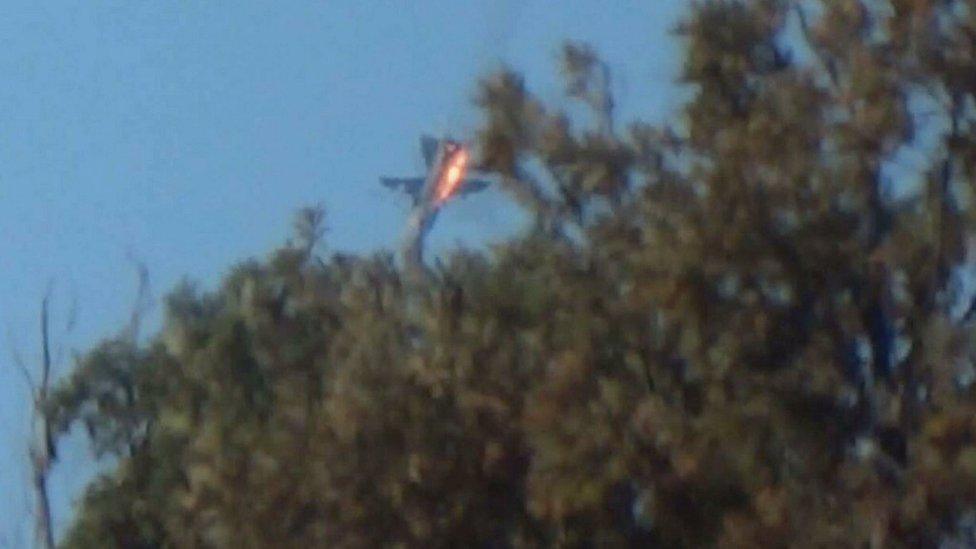
Russia denied that the warplane had crossed Syria's border and violated Turkish airspace
Russia's President Vladimir Putin has condemned Turkey's shooting down of a Russian warplane on its border with Syria on 24 November.
It is the first time a Russian aircraft has crashed in Syria since Moscow launched air strikes against opponents of President Bashar al-Assad in September.

What happened?
Both Russia and Turkey say the Russian Su-24, an all-weather attack aircraft, was shot down by Turkish F-16s in the Turkey-Syria border area on 24 November.
This video shows a plane falling to the ground on the Syrian border with Turkey
President Putin said the plane, which had two crew members, was flying at an altitude of 6,000m (19,685ft) when it was hit by an air-to-air missile.
The plane crashed in the mountainous Jabal Turkmen area of the Syrian province of Latakia, which is contested by Syrian government and rebel forces. The pilot as well as a marine sent on a rescue mission by helicopter were killed.

Why was it shot down?
In a letter to the UN Security Council, external, Turkey's permanent representative Halit Cevik wrote that two aircraft of unknown nationality had approached Turkish airspace near the town of Yayladagi in Hatay province.

The planes were warned 10 times over the space of five minutes via an "emergency" channel and asked to change direction, he added.
Both planes disregarded the warnings and then flew 2.19km (1.36 miles) and 1.85km (1.15 miles) into Turkey for 17 seconds from 09:24:05 (07:24:05 GMT), according to Mr Cevik.
"Following the violation, plane 1 left Turkish national airspace. Plane 2 was fired at while in Turkish national airspace by Turkish F-16s performing air combat patrolling in the area. Plane 2 crashed on to the Syria side of the Turkish-Syrian border."
The Turkish military also published what it said was the radar image of the path the Russian plane took, showing it briefly flying across Turkey's southern-most tip.
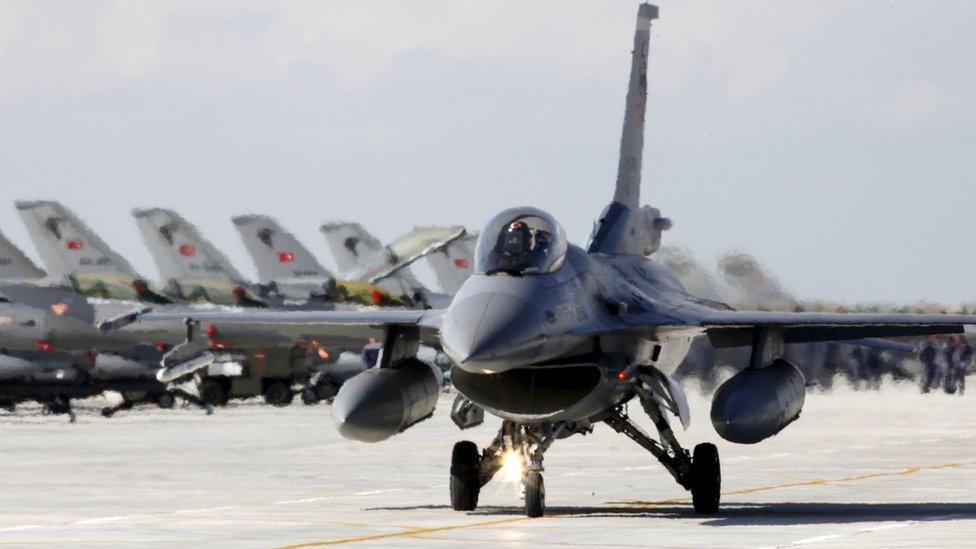
Turkey's military said its F-16s had acted "in accordance with the rules of engagement"
But Mr Putin said the Su-24 was over Syrian territory, 1km (0.6 miles) from Syria's border with Turkey, when it was hit. It crashed 4km from the border, he added.
The Russian defence ministry insisted that the aircraft remained within Syria's borders throughout its mission, did not violate Turkish airspace and received no warnings.
It published a video, external showing what it said was the Su-24's flight path.
The pilot who survived the crash, Capt Konstantin Murakhtin, told Russian television he had not received a warning before being shot down.
Later, Mr Putin said that the US military, "which leads the coalition that Turkey belongs to, knew about the location and time of our planes' flights, and we were hit exactly there and at that time".
The US state department denied that, insisting that Russia had not notified the US in advance about the flight.
US military officials said there were indications the downed plane entered Turkish airspace for a matter of seconds, and that it had been warned to stay out.
More details were given on 27 November by Russian air force commander Gen Viktor Bondarev. He said Russian and Syrian radar data pointed towards an "ambush" by the two Turkish F-16s.
The F-16s spent one hour and 15 minutes flying in the area where the incident happened, he said, and the one that fired the missile penetrated 2km inside Syria, spending 40 seconds in Syrian airspace.
The timings showed that they could not have taken off from their Diyarbakir airbase for the interception - they were poised to attack, he said.
The two Su-24s had just bombed two groups of rebels and one was shot down just after completing another bombing run, 5.5km south of Turkey, he said.

What happened to the crew?
Video footage published by Turkish media showed that the Su-24's two crew - the pilot and the navigator - ejected as their burning aircraft plummeted to the ground.
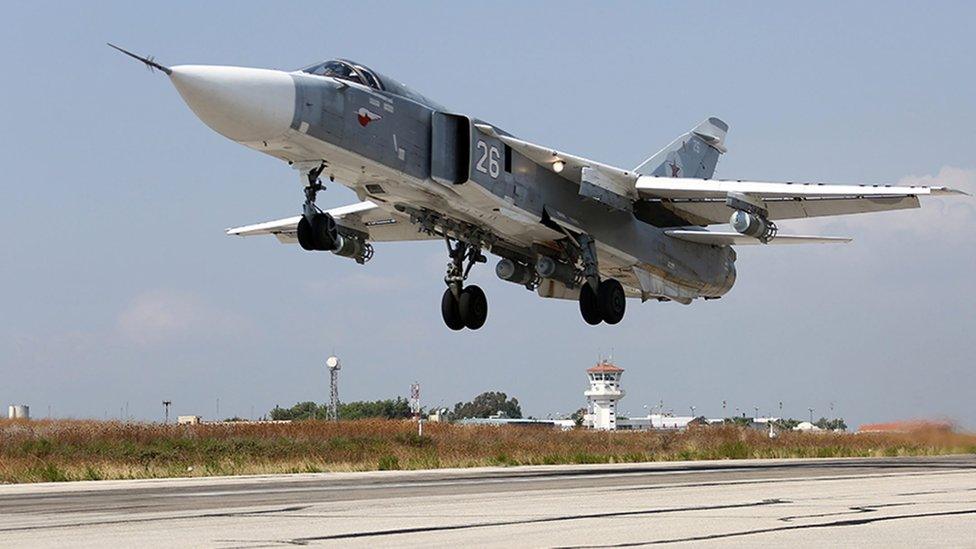
Russian Su-24 aircraft based in Latakia province have flown hundreds of sorties over Syria
Rebels from Syria's ethnic Turkmen community, whose villages Turkey said had been bombed by Russian aircraft in recent weeks, opened fire at the crew as they tried to parachute into government-held territory.
One of them was dead when he landed on the ground, the rebels said. A video was also posted online showing gunmen standing around a man in a flight suit who was immobile on the ground.
The next day, Russia confirmed the pilot, Lt Col Oleg Peshkov, had been killed.
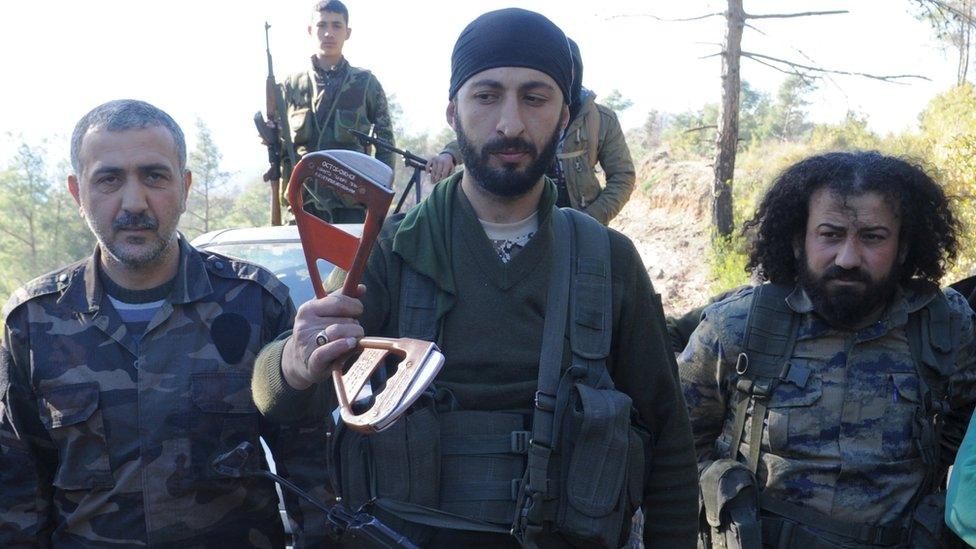
Syrian rebels said they had opened fire at the Su-24's crew as they descended by parachute
But it said the navigator, Capt Murakhtin, had been rescued and taken to Russia's Hmeimim airbase in Latakia by Syrian government forces.
A Russian marine, Aleksandr Pozynich, was also killed during an attempted rescue mission, when an Mi-8 helicopter he was travelling in came under fire.

Why was the Russian jet there?
Russia is one of several countries directly involved in the conflict in Syria, which has left more than 250,000 people dead since March 2011.
Moscow is an ally of President Assad and is conducting air strikes to prop up his government. It says it is targeting only "terrorists" - above all jihadist militants from Islamic State (IS).
But Western analysts say Russia's strikes have mainly hit Western-backed rebels fighting President Assad's troops.
The Su-24 bombers attacked by Turkey on 24 November were targeting "terrorists" from Russia's North Caucasus, the Russian government says.

Syrian rebels have meanwhile received substantial support from Turkey, an opponent of Mr Assad. Ankara also allows the US-led multinational coalition against IS to use its airbases to conduct strikes on the jihadist group in Syria.

How has Russia reacted?
Russian President Vladimir Putin says the jet was brought down over Syria
Russia immediately deployed S-400 anti-aircraft missiles at the Hmeimim airbase in Syria - a significant show of force in the troubled region.
The S-400 can hit targets up to 400km (248 miles) away, so at Hmeimim the missiles cover the airspace of Syria, Lebanon, Cyprus, half of Israel and a large swathe of Turkey, the Russian state-controlled news channel RT reports., external
It can hit any existing aircraft or missile travelling at speeds of up to 4.8km (three miles) per second, RT says. Targets at heights of up to 30km are within range.
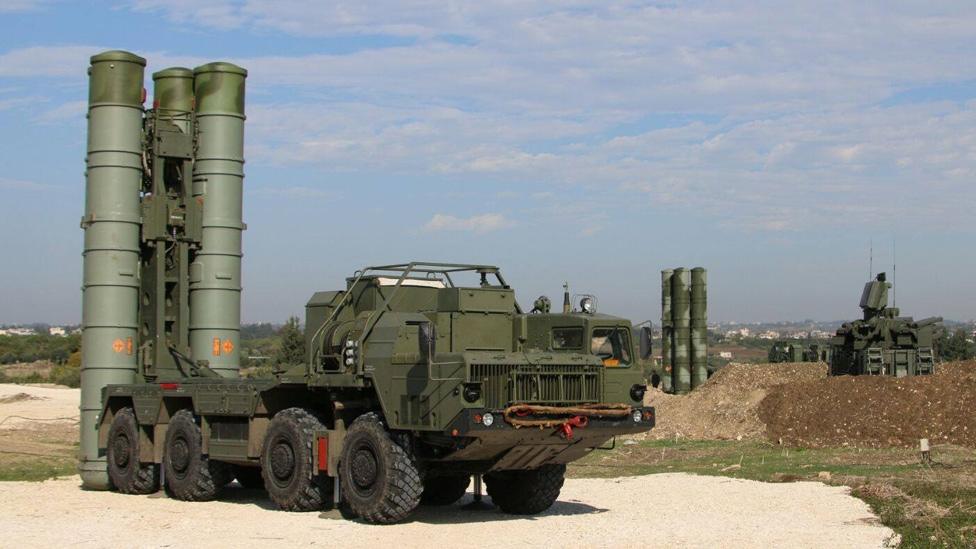
The Russian defence ministry showed S-400s deployed in Syria
Russia is also suspending the reciprocal visa-free regime with Turkey from 1 January.
Russia has banned charter flights to and from Turkey, and Russian travel firms have been told to stop selling Turkish holidays. That move and warnings to Russians not to travel to Turkey, are expected to hit Turkey's tourist industry, as it is a top destination for Russian tourists.
A decree signed by President Putin , externalon 28 November calls for the banning or limitation of imports from Turkey, the work of Turkish companies in Russia and any Turkish nationals working for Russian companies. The government is drawing up a list of the sectors affected.
The government says fruit and vegetables will be the main food imports to be restricted, starting in a few weeks' time.
Russia has already tightened inspections of Turkish food. It is an important market for Turkish exporters.
And President Putin has refused to speak to Turkish President Recep Tayyip Erdogan, despite the latter's phone calls, a Kremlin aide said. The reason: Mr Putin is waiting for Turkey to apologise. But Turkish PM Ahmet Davutoglu has made clear that "no Turkish prime minister or president will apologise ... because of doing our duty'.'
Mr Putin insisted that the downed Su-24 had "posed no threat". He said it had been carrying out "preventative attacks" against IS in Latakia, and also that Russia had established large quantities of oil were entering Turkey from IS-held areas, providing the jihadist group with significant funding.
"This was a stab in the back by the accomplices of terrorists," Mr Putin stated.
Although Turkey's policy of allowing Syrian rebel fighters and arms shipments to pass through its territory has been exploited by IS, officials have denied, external supporting the group. Activists say IS has little or no presence near the crash site.

Is Nato backing Turkey?
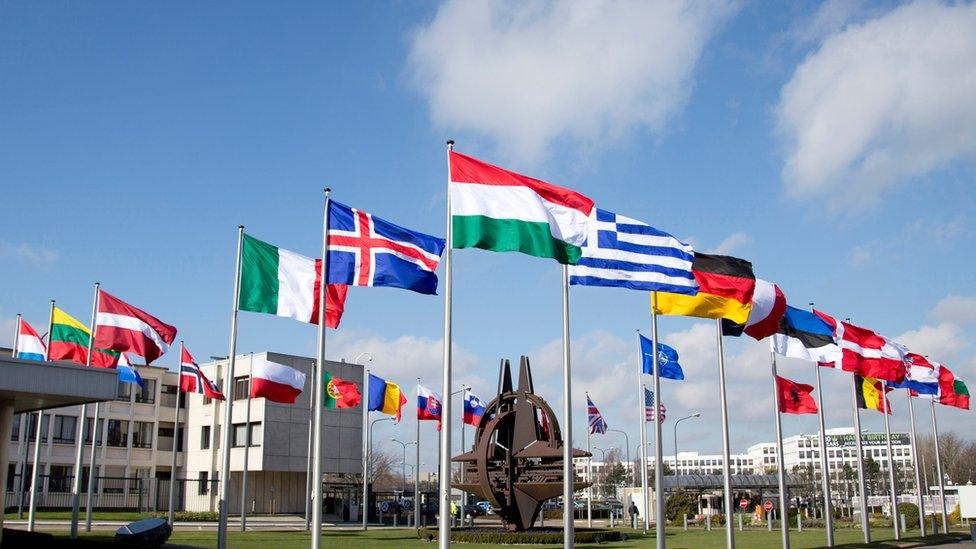
Nato said it was in close contact with Turkey after the Russian jet was downed
The last time a Nato state shot down a Russian or Soviet plane was in the 1950s.
After an extraordinary meeting of the alliance's main decision-making body, the North Atlantic Council, Secretary-General Jens Stoltenberg declared, external: "We stand in solidarity with Turkey and support the territorial integrity of our Nato ally."
President Recep Tayyip Erdogan: ''The actions were fully in line with Turkey's rules of engagement''
President Erdogan warned that "everyone should respect the right of Turkey to defend its borders".
He also noted that Turkey's actions were fully in line with the new rules of engagement adopted after Syria shot down a Turkish jet in 2012. The rules state that all "elements" approaching from Syria are considered an enemy threat.